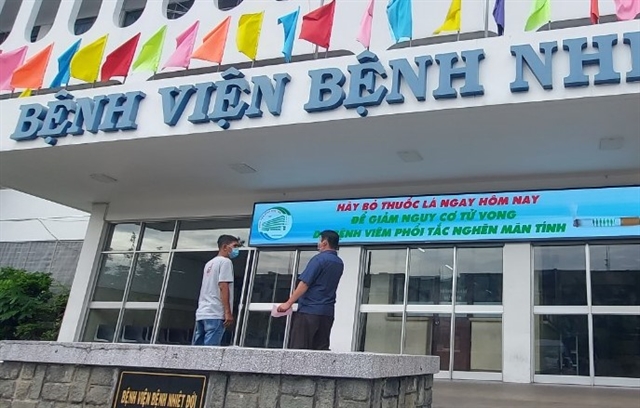 Society
Society


|
| The individual infected with A/H9N2 is being treated in isolation at HCM City Tropical Diseases Hospital. — VNA/VNS Photo |
HCM CITY — Việt Nam records the first-ever A/H9N2 infection, in a male patient from the southern province of Tiền Giang, health authorities confirmed.
Prof Dr Nguyễn Vũ Thượng, Deputy Director of Pasteur Institute in HCM City, said late Saturday that immediately upon receiving information about the case of A/H9N2 flu in a patient undergoing treatment at the HCM City Tropical Diseases Hospital, the institute had closely coordinated with the hospital and the provincial health department of Tiền Giang to map out the epidemiological investigation area and assess the risk.
The patient is currently being treated in an isolation ward.
The veterinary department of Tiền Giang Province found that there is an active area for poultry sales and slaughter near his residence.
Individuals who have been in close contact with the patient remain healthy so far. No cluster of respiratory infections within the local community has been detected.
According to the report from HCM City’s health department, the patient was admitted to the tropical diseases hospital on the afternoon of March 16 with a diagnosis of gastrointestinal bleeding ulcer, accompanied by alcoholic liver fibrosis and sepsis monitoring.
During treatment, the patient developed pneumonia with lung damage observable on X-ray scans. Nasopharyngeal swabs were taken for PCR testing for influenza viruses A and B. As respiratory distress worsened, the patient was intubated and put on a ventilator.
On March 22, the result of the first nasopharyngeal swab test for the patient was positive for influenza A and negative for influenza B, but the strain was not identified.
On March 26 a follow-up X-ray showed no improvement in lung tissue damage, and another nasopharyngeal swab (second test) was taken for PCR testing for influenza A and B viruses.
By April 1, it was finally confirmed through genetic sequencing that the man was infected with A/H9N2 influenza virus.
The infection control department is also monitoring the health status of healthcare workers who were involved in the care of the patient (all staff in contact with the patient since admission are required to use appropriate protective equipment as per regulations).
Tiền Giang’s health authorities will continue epidemiological investigation, particularly regarding the patient's travel history and contacts, in order to limit the risk of community spread.
Of note, the seven close contacts of the patient in Tiền Giang will have to self-monitor their health at home, while the patient’s house and personal belongings will be disinfected.
Thượng said that since March, the Ministry of Health and the Ministry of Agriculture and Rural Development have held meetings and provided guidance to enhance disease control and prevent transmission from animals to humans, including avian influenza.
“We have prepared plans to respond, monitor and investigate such cases,” said the doctor.
Thượng said that A/H9N2 has been recorded in humans since 1988 in China, with 135 human cases recorded worldwide so far.
A/H9N2 influenza primarily spreads from poultry to humans, and there is thus far no evidence of human-to-human transmission.
The symptoms of the disease are similar to other flu-like illnesses, such as fever and cough.
Among the logged cases, most have mild to moderate symptoms.
However, there have been two fatalities, both with underlying diseases and weakened immune systems.
The Vietnamese patient in question also has severe underlying conditions, according to the Pasteur doctor.
Prof Dr Thượng reassured that A/H9N2 is considered a mild disease in animals and poultry, but regardless of the strain, people should remain cautious.
Individuals at elevated risk, such as those in frequent contact with poultry, raising poultry, or slaughtering poultry, should wear masks and wash hands frequently to avoid poultry secretions from entering the nose or mouth.
Absolutely no slaughtering or transporting of poultry of unknown origin or sick poultry is allowed.
Suspicious cases of ill or dead poultry must be reported to local health authorities.
The health ministry noted that this is currently the changing of seasons, which is conducive for the development of avian flu diseases. — VNS




